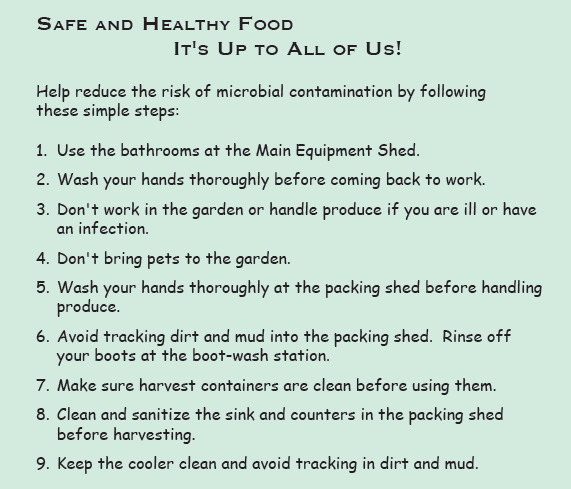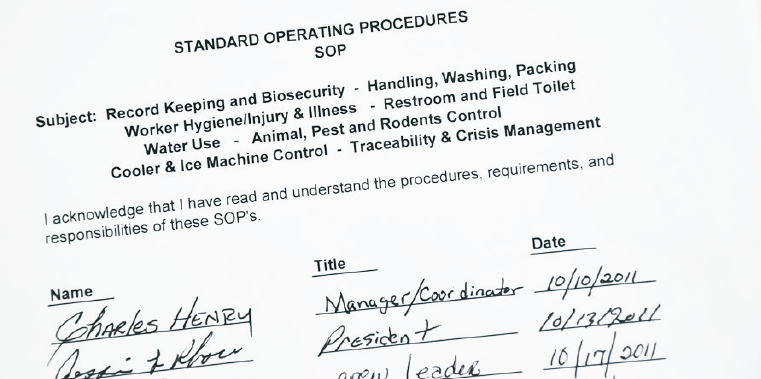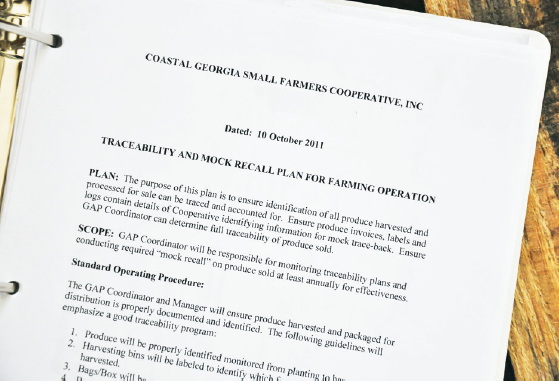Enhancing The Safety of Locally Grown Produce: Training and Certification Options
ID
FST-44NP (FST-341NP)
Local, small-scale farmers are proud of the fruits and vegetables they produce and strive to offer products that are inherently safe and healthy for consumers. However, although rare, foodborne illnesses have been associated with the production and handling of fresh produce. Fruits and vegetables that are eaten raw pose the greatest risk since cooking will kill pathogens. Contaminated fruits and vegetables may seem like an unlikely problem for your farm, but just one incident can have devastating consequences. Large outbreaks of foodborne illness linked to produce can devastate markets as was seen with spinach in 2006-2007 and more recently with romaine lettuce in 2018-2019. News of outbreaks tends to cause losses in revenue, even for farmers not involved in the outbreak. Instances of foodborne illnesses hurt both the farmer and the market. Lawsuits have resulted in costly settlements for farmers. Although sources of contamination can never be totally eliminated, there are many steps you can take to minimize risk. One of the most important steps is training – both yourself and your workers. Learning about risky practices and taking steps to implement best practices to minimize risk is the best thing you can do to protect yourself, your farm, and the people who buy from you.
Training
Workers should be trained on the safe food handling practices related to their tasks, the importance of reporting illnesses, and not working with produce when they are sick. Workers should be trained when they are first hired and have a refresher training at least once a year or if a problem arises. Training should be documented through recordkeeping. If you need to comply with the Produce Safety Rule that is a part of the Food Safety Modernization Act, training is required. Even if you are exempt from this rule, providing training for your workers is essential to maintaining the safety of your products. Training should be documented through recordkeeping. If you need to comply with the Produce Safety Rule that is a part of the Food Safety Modernization Act these practices are mandated. - edited slightly to:Training should be documented through recordkeeping. If you need to comply with the Produce Safety Rule that is a part of the Food Safety Modernization Act this training is required. Training does not have to be difficult. You should establish some standard procedures for production, worker hygiene, harvesting, post-harvest handling and even transporting produce to market. Tips for good practices in these areas can be found in the companion factsheets. You should actively go through these procedures with your workers and explain how you want things done. Once written procedures are developed, they should be easily accessible and readable by the workers in their native language to remind them of important points. You should also periodically review and update procedures as needed, and remind your workers why they are important.

Certifications
Because of concerns over food safety, many wholesale and institutional produce buyers are requiring their farm suppliers to have some type of food safety certification. Even some direct market outlets may require farm suppliers to have food safety certification or at least evidence of training in food safety practices. One option for additional training if you need to meet the requirements of the Produce Safety Rule is the Produce Safety Alliance (PSA) Grower Training. Participants who attend these trainings earn a certificate from the Association of Food and Drug Officials. To find a PSA Grower Training near you, visit the Produce Safety Alliance website. Many buyers may also demand that growers have a third party audit program for their farm.
There are a number of certifying agencies that conduct food safety audits on farms and that offer food safety certification programs. The USDA GAP/GHP (Good Agricultural Practices/Good Handling Practices) program is commonly used by small-scale producers because, depending on the situation, GAP may be one of the least expensive certification programs and GAP training and educational resources are readily available.

USDA hGAP program
The USDA hGAP program is an audit/certification program with a focus on food safety. The program was requested by growers to meet buyer demands for higher food safety standards, and is based on a 1998 FDA publication: Guide to minimize microbial food safety hazards for fresh fruits and vegetables and the Produce Safety Rule. USDA hGAP is not mandatory, but producers who sell to the federal government must meet hGAP standards, and hGAP has been adopted by others in the food industry.
The USDA GAP program is the most basic. There are six components.
- Part 1: Farm Review (potential risks from water source, livestock, manure, soils)
- Part 2: Field Harvesting and Field Packing (covers toilet and handwashing, containers and equipment, wash water, product identification)
- Part 3: House Packing (washing/packing line, sanitary procedures, ice, wastewater, worker hygiene)
- Part 4: Storage and Transportation
- Part 5: Wholesale Distribution/Terminal Warehouse
- Part 6: Preventative Food Security Procedures (such as visitor logs, facility monitoring procedures, etc.)

Farms without packing or storage facilities would be exempt from those parts of the audit. During the audit, the farmer must show evidence that various food safety practices are in place. This could be in the form of records, documentation, and/or written procedures called Standard Operating Procedures (SOP) followed by the farmer and employees. The farm must have a
Food Safety Plan that contains the following:
- Brief history of the operation
- List of employees and duties
- Map of location and operation
- GAP/GHP training certificates if available
- Product floor plan for packing houses
- Required procedures and sample records (standard operating procedures specific to the operation)
Although the Produce Safety Rule requires no traceability system or mock recalls to be conducted, audit programs may include traceability and recall plans. Traceability plans allow growers to trace their produce from the field to the packer, distributor or retailer. Records kept to verify the plan should indicate date of harvest, farm identification, and who handled the produce. Having a mock recall occasionally is a way a grower can test their traceability plan to make sure it works in the event a problem is identified with their produce. Farms may fail an audit if the inspector observes any immediate food safety risk, for example the presence of rodents or pets in a produce handling area, or lack of handwashing facilities. Other factors leading to disqualification may include employee practices that might jeopardize produce safety, tampering of records, no Food Safety Plan or no one at the farm designated to oversee the food safety program.
Reasons to obtain a PSA Grower Training Certificate and to implement audit programs on the farm
- Adoption of these programs will increase market opportunities.
- Farms with good agricultural practices, audit programs and records may be better protected in case of a lawsuit.
- Farms with PSA Grower Training and hGAP certification may have lower insurance premiums.
- Most hGAP recommendations are simple, common sense procedures.

Additional audit information can be found at the USDA websites: www.ams.usda.gov/gapghp and www.ams.usda.gov/services/ auditing/gap-ghp/harmonized Additional information on the Produce Safety Alliance Grower Training can be found at https://producesafetyalliance.cornell.edu/. For more information on training programs that may be available on-line or in your area, contact your local county Extension office or your state Department of Agriculture.
This project was supported all, or in part, by a grant from the National Institute of Food and Agriculture, United States Department of Agriculture (Award Number 2009-51110-20161) and the Food Safety Outreach Program [grant no. 2016 0020-25888/project accession no. 1010671] from the USDA National Institute of Food and Agriculture.
Publication #FDNS-E-168-10, 2nd Edition. G. Zehnder, J.W. Gaskin, J.A. Harrison, M.A. Harrison, R. Boyer, J. Cannon and K. Woods.
The University of Georgia and Ft. Valley State University, the U.S. Department of Agriculture and counties of the state cooperating. Cooperative Extension, the University of Georgia Colleges of Agricultural and Environmental Sciences and Family and Consumer Sciences, offers educational programs, assistance and materials to all people without regard to race, color, national origin, age, gender or disability. An Equal Opportunity Employer/Affirmative Action Organization, Committed to a Diverse Work Force.

Virginia Cooperative Extension materials are available for public use, reprint, or citation without further permission, provided the use includes credit to the author and to Virginia Cooperative Extension, Virginia Tech, and Virginia State University.
Virginia Cooperative Extension is a partnership of Virginia Tech, Virginia State University, the U.S. Department of Agriculture, and local governments. Its programs and employment are open to all, regardless of age, color, disability, sex (including pregnancy), gender, gender identity, gender expression, genetic information, ethnicity or national origin, political affiliation, race, religion, sexual orientation, or military status, or any other basis protected by law.
Publication Date
January 15, 2025



